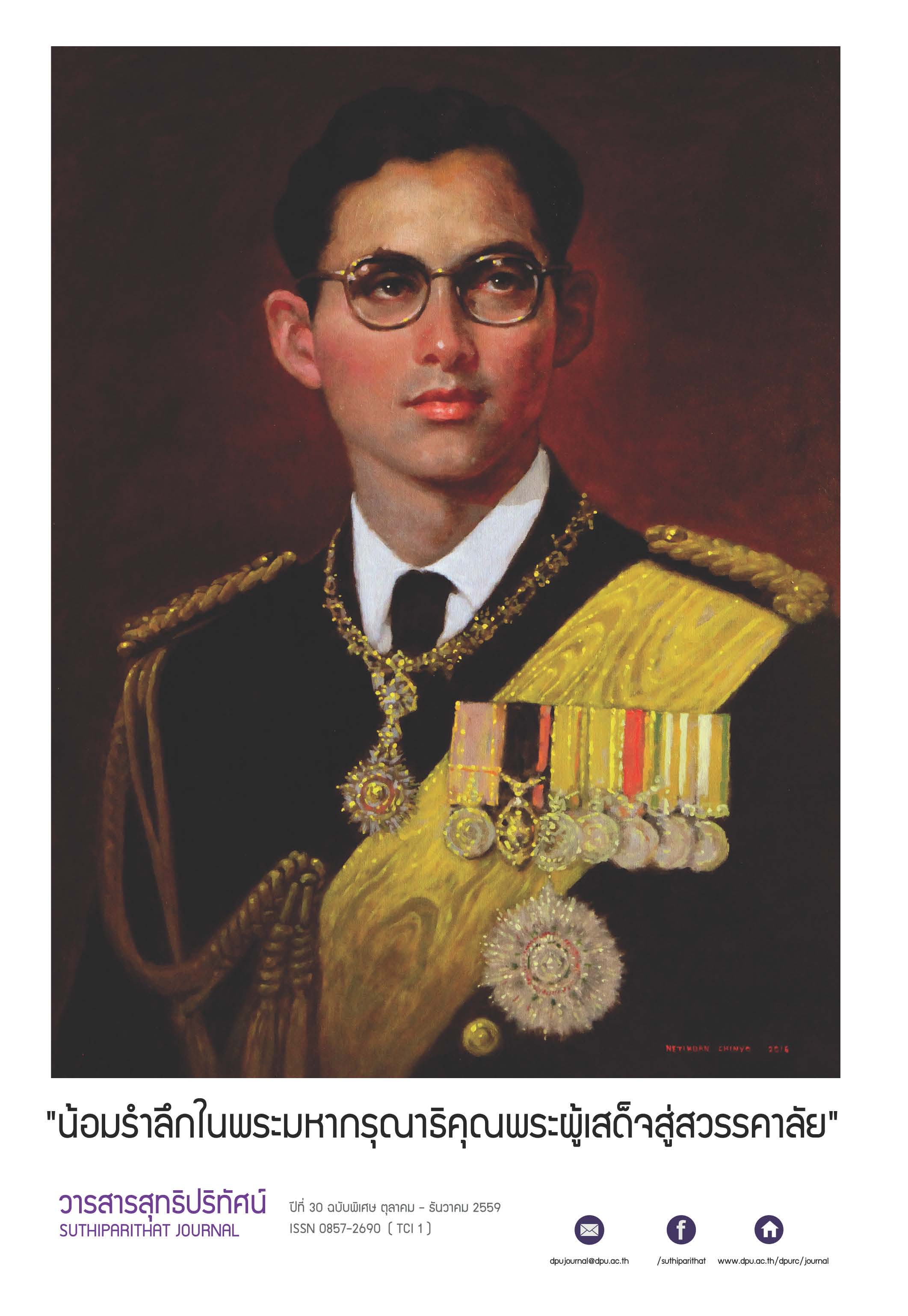การวัดคุณภาพการให้บริการของโรงแรม: กรณีศึกษาของโรงแรมขนาดกลาง ในกรุงเทพมหานคร MEASURING HOTEL
คำสำคัญ:
คุณภาพการให้บริการ, ทฤษฎี SERVQUAL, โรงแรมขนาดกลาง, กรุงเทพมหานครบทคัดย่อ
โรงแรมระดับ 3 และ ระดับ 4 ดาว ซึ่งจัดเป็นโรงแรมขนาดกลาง (midscale hotels) สร้างอัตราผลตอบแทนต่อการลงทุนที่สูงกว่ากลุ่มโรงแรมขนาดอื่นๆ ในกรุงเทพมหานคร อย่างไรก็ตามโรงแรม ขนาดกลางเหล่านี้ก็ยังประสบปัญหาจากจำนวนผู้ประกอบการโรงแรมที่มากกว่าความต้องการของลูกค้า และการขาดความแตกต่างที่ชัดเจนทางด้านผลิตภัณฑ์ ดังนั้น ผู้บริหารโรงแรมขนาดกลาง ควรใช้แนวคิดคุณภาพการให้บริการ เพื่อสร้างความได้เปรียบทางการแข่งขัน โดยการให้บริการที่เหนือกว่าระหว่างความคาดหวังของลูกค้า
งานวิจัยเรื่องนี้ใช้ทฤษฎี SERVQUAL เพื่่อวัดคุณภาพการให้บริการของโรงแรม โดยใช้กรณีศึกษาของโรงแรมขนาดกลางในกรุงเทพมหานคร ผลการวิจัยพบว่าคุณภาพการให้บริการที่ได้รับจริงอยู่ในระดับสูงกว่าความคาดหวังของคุณภาพการให้บริการและความแตกต่างดังกล่าวอย่างมีนัยสำคัญ โดยรูปลักษณ์ทางกายภาพ (tangibles) ของโรงแรมขนาดกลาง เหนือความคาดหวังของลูกค้ามากที่สุด ส่วนการให้ความมั่นใจ (assurance) และการดูแลเอาใจใส่ (empathy) ของโรงแรมขนาดกลาง เหนือความคาดหวัง ของลูกค้าน้อยที่สุด
เอกสารอ้างอิง
Aaker, D., Kumar, V., & Day, G. (2004). Marketing Research (8th ed.). New York: John Wiley & Sons, Inc.
Alexandris, K., Dimitriadis, N., & Markata, D. (2002). Can perceptions of service quality predict behavioral intentions? An exploratory study in the hotel sector in Greece. Managing Service Quality, 12(4), 224-231.
Blešiš et al. (2011). Research of Expected and Perceived Service Quality in Hotel Management. Journal of Tourism, 11(11).
Boon-itt, S., & Rompho, N. (2012). Measuring Service Quality Dimensions: An Empirical Analysis of Thai Hotel Industry. International Journal of Business Administration, 3(5), 52-63.
Brassett, J., & Watson, M. (2010). The Political Economy of the Subprime Crisis: The Economics, Politics and Ethics of Response. New Political Economy, 15(1).
Clow, K., Kurtz, D., Ozment, J., & Ong, B. (1997). The antecedents of consumer expectations of services: an empirical study across four industries. Journal of Services Marketing, 11(4), 230 - 248.
Department of Tourism. (2016). Tourism statistics. Retrieved 20 October 2016, from http://www.tourism.go.th/farms/uploaded/00Statistic/2016/OR/OR%20July%202015P.pdf
Grant Thornton. (2016). Thailand Hotel Survey 2016. Retrieved 29 November 2016, from http://www.grantthornton.co.th/globalassets/1.-member-firms/thailand/publictions-pdf/grant-thornton-thailand-hotel-survey-2016.pdf
Hotel News Now. (2013). Hotel development takes off in Thailand. Retrieved 29 November 2016, from http://www.hotelnewsnow.com/Articles/19618/Hotel-development-takes-off-in-Thailand
JLL Hotels & Hospitality Group. (2016a). Hotel Destinations Thailand. Retrieved 28 November 2016, from http://www.jll.co.th/thailand/en-gb/Research/Hotel-Destinations-Thailand-January-2016.pdf?d3eeeb6b-57aa-4f0f-9a54-6a4a92bfe893
JLL Hotels & Hospitality Group. (2016b). Why Thailand’s tourism industry is smiling again. Retrieved 29 November 2016, from http://www.jllrealviews.com/industries/why-thailands-tourism-industry-is-smiling-again/
Langdon, A. (2013). Thailand’s midscale hotels: a latent investment opportunity? Retrieved 29 November 2016, from http://www.ttgasia.com/article.php?article_id=21407
Laws, E. (2004). Improving Tourism and Hospitality Services. Wallingford: CABI Publishing.
Markovic et al. (2013). A study of expected and perceived service quality in Croatian and Slovenian hotel industry. European Journal of Tourism Research, 6(1).
Markovic, S., & Raspor, S. (2010). Measuring Perceived Service Quality Using servqual: A Case Study of the Croatian Hotel Industry. Management, 5.
Motlagh et. al. (2013). How Does Service Quality Lead to Loyalty in the Hotel Industry in Iran. Research Journal of Applied Sciences, Engineering and Technology, 5(2), 374-379.
Parasuraman, A., Zeithaml, V., & Berry, L. (1988). ServQual: A multiple-tem scale for measuring consumer perceptions of service quality. Journal of Retailing, 64(1).
Pathnadabutr, A. (2012). Hotel Oversupply in Bangkok shows no sign of Slowing down. Retrieved 10 October 2016, from http://www.thailand-business-news.com/real-estate/36122-hotel-oversupply-in-bangkok-shows-no-sign-of-slowing-down.html
Ramanathan, U., & Ramanathan, R. (2011). Guests’ perceptions on factors influencing customer loyalty. International Journal of Contemporary Hospitality Management, 23(1), 7-25.
Rauch, D., Collins, M., Nale, R., & Barr, P. (2015). Measuring service quality in mid-scale hotels. International Journal of Contemporary Hospitality Management, 27(1), 87-106.
Seyanont, A. (2007). A comparative study of the service quality of casual dining restaurants in Phuket: Perspective of Thai and international customers. (Doctor of Philosophy). USA: Oklahoma State University.
Skaliotis, V., & Sääf, H. (2006). Why the brand? The challenge for mid-scale hotels. (Master Degree), Goteborg University. Retrieved 9 September 2016, from https://gupea.ub.gu.se/bitstream/2077/2221/1/Skaliotis.pdf
Sriyam, A. (2010). Customer satisfaction towards service quality of front office staff at the hotel. (Master degree). Bangkok: Srinakharinwirot University. STR. (2013). 2013 STR global chain scales. Retrieved 4 August 2016, from http://www.strglobal.com/documents/STRGlobal_Chain_Scales.pdf
Tourism Authority of Thailand. (2016). Economics and Politics. Retrieved 20 October 2016, from https://www.tourismthailand.org/About-Thailand/Economy-Politic
Travel Center Asia. (2016). Hotel rating. Retrieved 29 November 2016, from http://www.travelcenterasia.com/Hotel-rating.php
Tselepidakis, Y. (2013). The Use of Twitter by Luxury and Midscale Hotels. University of New Hampshire. Retrieved 4 August 2016 from http://scholars.unh.edu/cgi/viewcontent.cgi?article=1104&context=honors
Vatjanasaregagul, L. (2007). The relationship of service quality, consumer decision factors and brand equity. (Doctoral Degree). USA: Nova Southeastern University.
Yamane, T. (1973). Statistics: An Introductory Analysis (3rd ed.). New York: Harper and Row Publication.
ดาวน์โหลด
เผยแพร่แล้ว
รูปแบบการอ้างอิง
ฉบับ
ประเภทบทความ
สัญญาอนุญาต
เนื้อหาและข้อมูลในบทความที่ลงตีพิมพ์ในวารสารสุทธิปริทัศน์ ถือเป็นข้อคิดเห็นและความรับผิดชอบของผู้เขียนบทความโดยตรงซึ่งกองบรรณาธิการวารสาร ไม่จำเป็นต้องเห็นด้วย หรือร่วมรับผิดชอบใด ๆ
บทความ ข้อมูล เนื้อหา รูปภาพ ฯลฯ ที่ได้รับการตีพิมพ์ในวารสารสุทธิปริทัศน์ ถือเป็นลิขสิทธิ์ของวารสารสุทธิปริทัศน์หากบุคคลหรือหน่วยงานใดต้องการนำทั้งหมดหรือส่วนหนึ่งส่วนใดไปเผยแพร่ต่อหรือเพื่อกระทำการใด ๆ จะต้องได้รับอนุญาตเป็นลายลักษณ์อักษรจากวารสารสุทธิปริทัศน์ก่อนเท่านั้น







